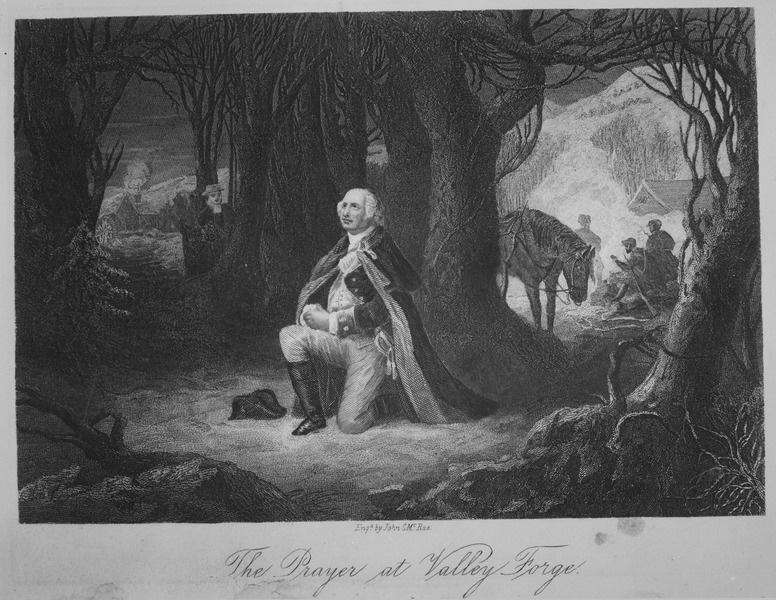Snell: December means more than a holiday break
Photo courtesy of Wikimedia Commons
The Prayer at Valley Forge
December 14, 2011
For some of you, this Friday will be
your last day as a college student. I congratulate you and wish you
well. But I do so with a touch of sadness, for as a returning
student I know better than most just how special this time is.
You may be desperate to be done now,
but with age comes wisdom, and wisdom will eventually reveal just
how wonderful the last few years have been for you. I wish for you
that this day comes sooner than it did for me.
For all of us though, whether only
for a few weeks or forever, we face the holiday break. In the best
spirit of America, the meanings and traditions of the holidays are
as individual and unique for us as we are ourselves.
A lot has happened in the month of
December through the years. I am a history major who comes from a
family with a military tradition, and have myself participated in
our current and ongoing war. These and other things combine to
color my outlook on the month of December and generate within me my
own personal meaning for the holidays.
We associate the year 1776 with
independence, patriotism and freedom from tyrannical rule. The
truth of 1776 is much different, however, as the American
experiment was very much in danger of being extinguished before it
got started. Gen. George Washington was handed defeat after defeat
by the British and he very nearly resigned.
In a letter to his cousin Lund in
December 1776, Washington said, “I wish to Heaven it was in my
power to give you a more favourable Acct of our situation than it
is-our numbers, quite inadequate to the task of opposing [the
British Army] … We were obliged to retire before the Enemy, who
were perfectly well informed of our Situation till we came to this
place, where I have no Idea of being able to make a stand …”
We were desperate and the fate of the
newborn nation was hanging in the balance. But shortly after in an
act of brilliance and desperation, Washington crossed the Deleware
River, on Christmas Eve, and soundly defeated the Hessians in the
Battle of Trenton.
One year later, in December 1777,
Washington had cause to wish he was back in New Jersey. The
Continental Army found itself at a place called Valley Forge in
Pennsylvania. Starving and afflicted with dysentery and other
diseases, we endured the greatest hardships yet.
Many of our men had no clothes for
winter, and several were without shoes. Your revolutionary
ancestors stood barefoot on their hats in the snow and drilled with
their muskets.
On the brink of obliteration,
Washington was despondent: “… three or four days bad weather
would prove our destruction. What then is to become of the Army
this Winter? [A]nd if we are as often without Provisions now, as
with them, what is to become of us in the Spring …?”
Washington continued: “although
[Congress] seems to have little feeling for the naked and
distressed Soldier, I feel superabundantly for them, and from my
soul pity those miseries, which it is neither in my power to
relieve or prevent … [I]t adds not a little to my other
difficulties and distress, to find that much more is expected of
me, than is possible to be performed …”
Yet we rallied and won the Battle of
Monmouth a few months later, and the tone of the Revolution
changed. The Continental Army came out of Valley Forge something
transcending their true state and Washington could barely do
wrong.
To put it bluntly, you have your
freedom today because starving, nearly naked men who couldn’t keep
their lunch down wouldn’t give up.
December 1941 brought another test of
fortitude when the Japanese attacked Pearl Harbor and surrounding
targets, causing 3,741 military and civilian casualties. We were
caught unprepared and were fairly beaten, but as always, we joined
together and eventually accomplished the monumental.
A few years later, in a scene
reminiscent of Valley Forge, the Germans had the 101st Airborne
surrounded in the Battle of the Bulge in December of 1944. Belgium
had record low temperatures and snowfall that year, as if God
himself wanted us to lose. Our men marched in with little ammo, no
winter clothing and not a hope in hell. We were socked in and
screwed over, but we came out on top like we always seem to.
So as you go home this break, pause
during the holidays and think about those paratroopers who sat in
foxholes, literally freezing and starving, while enduring constant,
incessant German artillery and armor attacks. Think about the young
men in Pennsylvania so long ago who shivered barefoot, standing in
the snow bank on their hats, drilling with their muskets while
trying to learn to be an army.
Give some thought and silent thanks
to those Americans out there who have lived and currently are
living the very ideals that make the endurance of this country
possible. Sacrifice isn’t just a catchphrase, and patriotism isn’t
just waving a flag. They really and truly mean something.
Merry Christmas, everyone.







